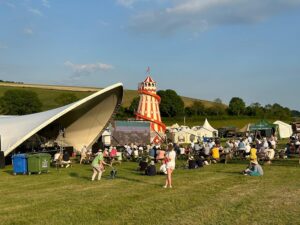CHF 2025: Day 1
Whoever gets first billing at Chalke sets the tone for the week-long festival. Last year it was Giles Milton and Stalin (Russia must have been top of mind in 2024 for some reason!). This year it was the English Civil War.
In REVOLUTION & REPUBLIC:ENGLAND IN THE 17th CENTURY, Paul Lay, Alice Hunt, and Jonathan Healey asked why seventeenth century England is having its moment now?
Lay, Hunt, and Healey agreed that ‘their’ period beats the Tudors hands down, variously because we live in ‘unsettling’ times, we are experiencing a palpable sense of neo-Puritanism, new forms of media (printing press v social), and the rise of state surveillance. Jonathan Healy also pointed out that the era boasts so many ‘bastards’ it’s a source of fascination and a reason for renewed interest.
 The issues that people cared about were not confined to the layout of the church or whether Calvin was right on predestination. Like today it was an era where people actively questioned religious freedom, the role of the state, and what is appropriate taxation level.
The issues that people cared about were not confined to the layout of the church or whether Calvin was right on predestination. Like today it was an era where people actively questioned religious freedom, the role of the state, and what is appropriate taxation level.
The panel agreed that the black and white caricature of dull roundheads and laughing cavaliers, and the claims that the population were apathetic, need to be revised. An amusing tale of a famer near Edgehill who was asked “Who are you for – King or Parliament?” responded “why has there been some sort of falling out?” suggesting a rustic sense of humour as rather than disinterest.
I was going to pass on Helen Thompson and John Gray, TRUMP AND THE END OF LIBERAL DEMOCRACY: WHAT NEXT?– anticipating the usual consensus on how awful he is. I caught 15 minutes of the discussion which was enough to confirm that Thomson and Gray are heavyweight academics and not MAGA fans. They were discussing Trump’s rhetoric on annexing Canada and why tariffs are not going to work, and explored the prospects for American economic and military leadership. I didn’t get the impression that either of them had spent much time with rust belt Americans (although if I am wrong I will gladly issue and apology and a correction.)
Alwyn Turner, LITTLE ENGLANDERS: BRITAIN IN THE EDWARDIAN ERA. Turner has written a narrative history of Britain in the Edwardian Era and treated his audience to an interesting discussion about how the popular image of Edwardian England as an era of leisurely aristocratic excess, actually belied a decisive shift into modern political ideas such as charity and the role of the state.
Adam Zamoyski, IZABELA THE VALIANT: THE STORY OF AN INDOMITABLE POLISH PRINCES. The ever-brilliant Adam Zamoyski, an aristocratic Pole who has written about Napoleon and Poland, treated an evening audience to his study of the brilliantly eccentric Izabela the Valiant. His warmth for his subject was evident (she was his great-great-great-great-grandmother), and we learned how central this extraordinary woman was to Polish and European history. A contemporary of Marie Antoinette, she was a party girl in ‘licentious and depraved Warsaw’, had many children by multiple partners, was fond of dressing up as a shepherdess with sheep and geese, and was an empathetic woman of the people who would walk alongside her carriage on long journeys in order to talk to ordinary folk she met along the way. Izabela was clearly and amazing woman who would I am sure have enjoyed being remembered at Chalke 200 years after her death.
Justin Doherty is Editor at Large at Aspects of History. Head to the CHF site here.






